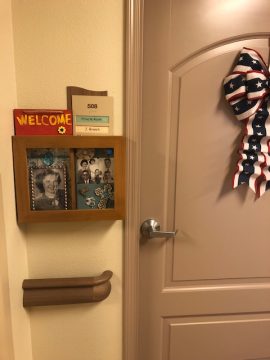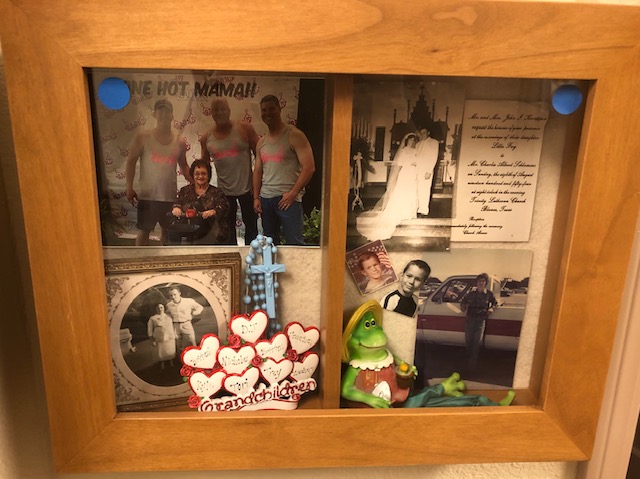 Over the last year, Legend Oaks in New Braunfels, Texas, has implemented shadow boxes for all long-term care residents in an effort to decrease wandering, increase the patient’s ability to engage in meaningful interactions with other residents/staff/caregivers, and provide personalized, meaningful care in accordance with the patient’s Allen Cognitive Level. Residents were evaluated by a licensed therapist and determined if skilled therapy services were appropriate for the design and implementation of an FMP (Functional Maintenance Program).
Over the last year, Legend Oaks in New Braunfels, Texas, has implemented shadow boxes for all long-term care residents in an effort to decrease wandering, increase the patient’s ability to engage in meaningful interactions with other residents/staff/caregivers, and provide personalized, meaningful care in accordance with the patient’s Allen Cognitive Level. Residents were evaluated by a licensed therapist and determined if skilled therapy services were appropriate for the design and implementation of an FMP (Functional Maintenance Program).
Skilled therapy services’ typical duration was 2.5 weeks to complete this FMP program “shadow box.” Initial evaluations were utilized to determine the patient’s Allen Cognitive Score, which consisted of the leather lacing test and placemat test to determine baseline (ACL) Allen Cognitive levels; however, the FAST and GDS can also be utilized and converted to an Allen Cognitive Score, if the Allen test(s) are unavailable.
 The patient’s Allen Cognitive Level was represented by color-coded dots on the outside of the shadow box, and the clinical staff, nurses and nurse aides received a three-week training course to increase their understanding of Allen Cognitive Levels and what each color represents. Examples of goals for the initial evaluation included:
The patient’s Allen Cognitive Level was represented by color-coded dots on the outside of the shadow box, and the clinical staff, nurses and nurse aides received a three-week training course to increase their understanding of Allen Cognitive Levels and what each color represents. Examples of goals for the initial evaluation included:
Short-term goals:
- “Patient will reminisce about past for a maximum duration of 30 minutes with min cues provided utilizing items from shadow box.”
- “Patient will identify location of room utilizing shadow box visual cue in 10/10 attempts in order to decrease wandering and decrease amount of assistance required to redirect resident back to room.”
- “Nursing/caregivers/staff will demonstrate 100% understanding of the patient’s risks/challenges/and preferences in accordance with the patient’s Allen Cognitive Level in order to provide personalized/meaningful care to the resident.”
- “Patient will maintain topic for a maximum duration of 15 minutes in order to increase the patient’s ability to engage in meaningful interactions.”
- “Patient will engage in conversational speech with other residents regarding content of shadow box for a maximum duration of 15 minutes in order to increase the patient’s ability to engage in social interactions.” (This is a good goal to include to be able to utilize the shadow boxes as a group treatment).
- “Caregivers/family/staff will be able to utilize items from shadow box to engage the resident in meaningful interactions with min cues provided.”
- “Caregivers/family/staff will demonstrate 100% understanding of the patient’s remaining abilities, risks and challenges in accordance with the patient’s Allen Cognitive Score.”
Long-term goals:
Perhaps you can utilize a “Social Validity Test” to assist with long-term goals. This test asks the resident questions such as: How often do you have difficulty locating your room? How knowledgeable are you of other resident’s lives? How much do other residents know about your own life? Options to answers were: not at all, some, extensive. These were assigned a point from 1-3, with 3 being the highest score. Long-term goals for this test:
- “Patient will increase shadow box social validity score from 1/6 to 5/6.”
Additional long-term goals can include increasing GDS and Allen Cognitive Scores.
Treatment Approaches:
During treatment, patients and family members (if able) engaged in a Life History and Questionnaire to determine memories of importance to the resident, appropriate items/pictures to reflect these memories, and patient’s preferences to provide personalized care. Timers can be set to measure how long the resident is able to reminisce about past, duration of time for topic of maintenance, and the patient’s ability to engage in conversational speech with other residents.
Additionally, if the resident exhibits difficulty in locating his/her room, measurements can be taken to determine if the resident’s ability to locate their room increases with shadow box cueing. You could also use group treatment to have residents explain their shadow box and engage in meaningful interactions with other residents. Extensive education is provided to caregivers/staff/family regarding Allen Cognitive Scores, providing the patients’ remaining abilities, risks and challenges.
Examples of Daily Treatment Encounter Notes:
- “Min cues provided, staff was able to provide three remaining abilities, risks, challenges, and preferences for the resident in accordance with Allen Cognitive Score.”
- “Patient was able to engage in meaningful interactions utilizing items from shadow box for a maximum duration of nine minutes.”
- “Resident able to locate room in 8/10 attempts utilizing shadow box as a landmark.”
- “Extensive education with patient’s family and staff regarding the resident’s remaining abilities, strengths and preferences.”

